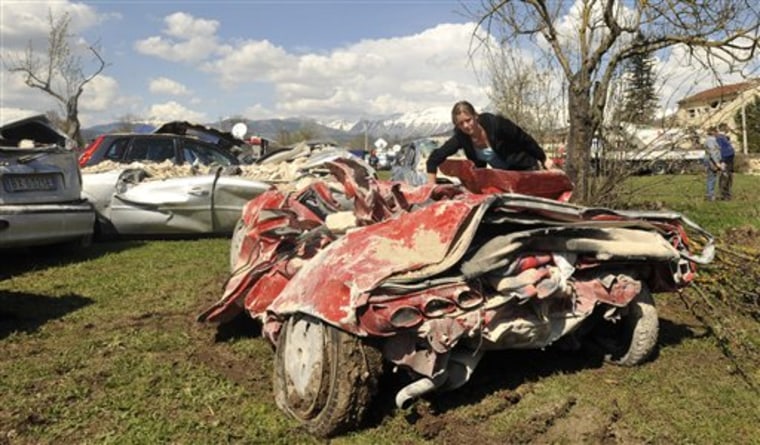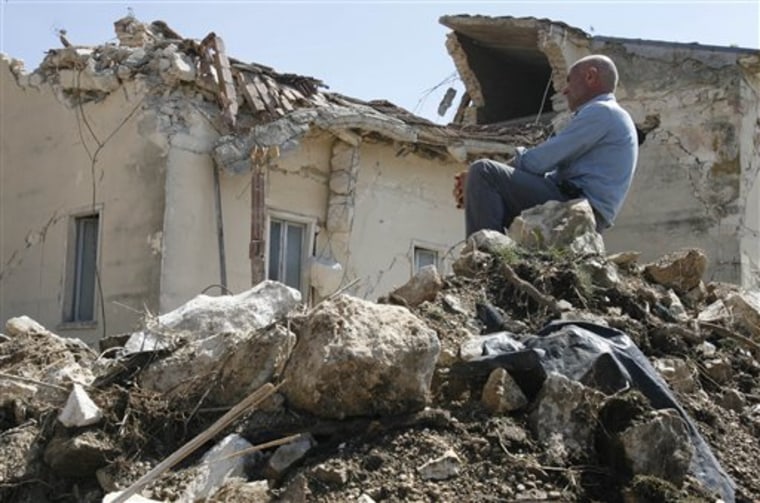In this tiny village where hardly anyone lives, barely anything is left standing.
Italy's deadly earthquake crushed people as they slept, killing 40 of the hamlet's 300 inhabitants and forcing the survivors to join a stream of 50,000 homeless in the region. It turned a picturesque, close-knit community into a saddened town populated by a few numbed survivors.
Some stumbled around, dazed, carrying a few prized possessions. Others wept or stared at heart-wrenching items jutting out of a pile of rubble three stories high: a child's shattered guitar, a little girl's play stroller — and a bloodstained mattress.
"It's so awful," Maria Rita Colaianni, 34, said Tuesday, clutching a gold-embossed vase she recovered from the wreckage of her pancaked home in Onna, 80 miles northeast of Rome in the heart of the quake zone.
"It seems like all the young people are the ones who died," said Colaianni, who — together with her parents and a brother — escaped with their lives. Her next-door neighbors all died, including a 6-year-old and an 8-year-old.
Rescue workers used cranes, bulldozers and their bare hands in a desperate search for survivors, and military transport helicopters thundered overhead, ferrying in fresh help and supplies.
'Ninety percent ... just crumbled'
But Maj. Cristina Di Tommaso of Italy's civil protection service, coordinating the effort in Onna, said there was little hope of finding anyone alive in the towering heaps of jagged concrete and twisted steel.
"Ninety percent of Onna just crumbled," she told The Associated Press.
Di Tommaso said efforts to determine how many villagers remain unaccounted for were complicated by authorities' discovery that an undetermined number of undocumented immigrants were staying in Onna when the quake struck early Monday.
Officials were still trying to find out where the migrants came from. Most of Italy's illegal immigrants are from Romania, northern Africa or the former Yugoslavia.
Villagers said many of Onna's younger teens were on a class trip to France when the quake hit. Some, they said, would be returning as orphans.
"It's hard because we know everyone, and we know every family lost at least two people: a brother or a cousin," said Martina Chiaravalle, 16, wandering a field looking for classmates among the blue canvas tents set up to house rescue workers and survivors.
On the road to Onna — which links the village to L'Aquila, a hard-hit city where victims were trapped in the wreckage of a university dormitory — quake refugees prepared to spend another chilly night in their cars. Some carried plastic buckets stuffed with loaves of bread, and still wore the same pajamas they had fled in 24 hours earlier.
Others pitched tents on the grass outside their homes, fearing one of the strong aftershocks that shook the area might bring the houses down on them if they dared venture inside.

Thousands more were making their way to Abruzzo's seaside, where hotel owners have made 6,500 hotel beds available to the newly homeless, said Emilio Shirato, president of Abruzzo's hotel association. Already, some 4,000 beds have been occupied with rescue workers still coordinating the arrival of more survivors.
"The offers of beds were completely spontaneous and decided by the hoteliers themselves in the desire to be close to their fellow Abruzzesi," Shirato said.
Many tried to return home during the day to retrieve belongings where possible, according to several hoteliers reached in the coastal town of Pescara. "They are a little traumatized," said Vicenzo Traversa, business manager of the Hotel Ambra, which took in 47 people, all families.
Onna's fieldstone church lay in ruins. So did others in neighboring towns, their statues of Jesus and Mary tilted at odd angles and their altars dusted with a layer of grit — reminders in this devoutly Roman Catholic country that an act of God struck at the start of Holy Week.
Man lost 15 relatives
Virgilio Colajanni, a 70-year-old retiree, choked back tears as his daughter-in-law cooked pasta over a gas stove in the family's cinderblock shelter.
"We lost 15 members of our family. Babies and children died," said Colajanni, recounting how the electricity cut out when the quake hit, forcing him to feel his way to the front door and safety.
Colajanni said he always loved living in Onna, a humble, honest place to raise a family.
"But now, this place will always remind me of death, not life," he said.
